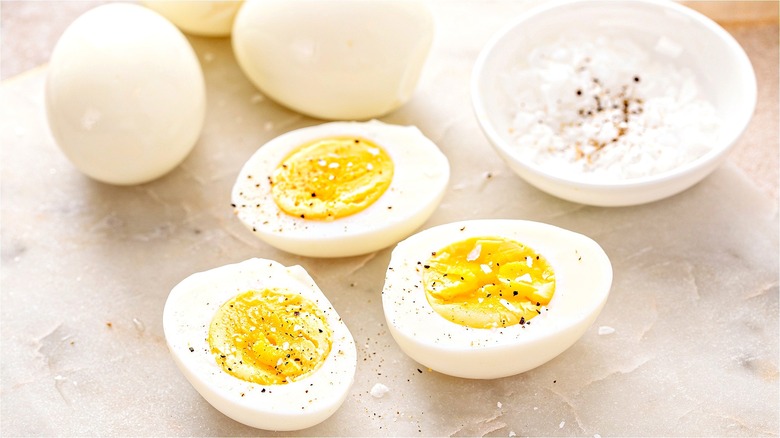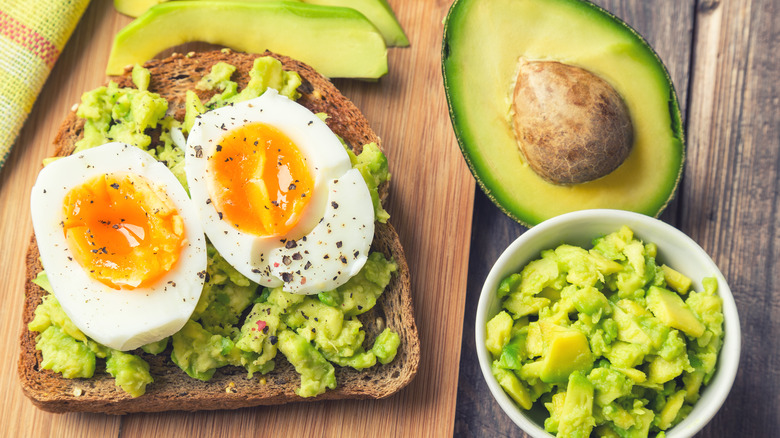The Hard-Boiled Egg Nutrition Fact You Definitely Need To Know
There are few convenient snacks we rely upon that provide both a quick burst of nutrition and a welcomed feeling of fullness. While you might already categorize hard-boiled eggs as a health food, you might not realize hard-boiled eggs are also a well-rounded, no-fuss snack.
If you place significance on the nutritional content of your food, protein is almost always considered a high priority. While eggs have an impressive amount of protein, they also pack a healthy amount of fat. Snacks that combine solid amounts of protein and healthy fats into one convenient package have a reputation for keeping you full and satisfied.
According to Healthline, one hard-boiled egg packs a little over 6 grams of protein and over 5 grams of fat. Next to the vitamins and minerals like vitamin A, phosphorus, and essential B vitamins, these ample stores of protein and fat also make hard-boiled eggs keep you full longer than you might expect.
Why protein and fat in hard-boiled eggs keeps your stomach satisfied
Among the several facts you should know about hard-boiled eggs, their ability to provide the body with healthy, similar amounts of protein and fat make them a superior food in terms of satiety. Foods high in protein and fat tend to linger in your stomach.
In a 1995 study, the satiety scale was developed to determine how 38 common foods ranked in terms of nutrition and fullness. Eggs scored quite high and came out comparable to other nutritionally sound options like baked beans, lentils, and cheese. They scored as less filling than steak, porridge, fish, apples, and oranges, but were about on par with filling options like all-bran cereal, popcorn, and grain bread. Due to their unique nutritional profile, eggs are not only good for you; they're also a certifiable way to abate hunger.
According to Cleveland Clinic, protein and fat both take a considerable amount of time for the body to digest or absorb. While basic carbohydrates consumed on their own take anywhere from 30 to 60 minutes to leave the stomach, carbohydrates combined with decent amounts of dense protein and fat, like sliced hard boiled eggs, may take closer to three hours to properly digest. This means you have more time to go about your day without feeling hunger pains. Now that you know the specifics regarding the added nutritional benefits of hard-boiled eggs, you may be ready to find more ways to enjoy them.
How to incorporate more hard-boiled eggs into your diet
If you're worried your weeks are too full to cook a quick batch on a normal Monday or Wednesday, set aside some time on the weekend and keep them in the fridge. To enjoy hard-boiled eggs more easily, you need to be able to peel them without losing half of your snack in the process. Therefore, learn the best way to peel hard-boiled eggs by dumping them into an ice bath as soon as they're done on the stovetop.
A container of pre-cooked eggs set aside in your fridge is guaranteed to stay fresh, with or without shells, for one week. To make the most out of your eggs, consider pairing them with whole-grain carbohydrates. Slice eggs on toasted bread smeared with a bit of butter or heart-healthy avocado. You can also enjoy them as part of an afternoon snack plate or chopped into a green salad. For more creative uses, make mini keto BLTs with them, or put a hard-boiled egg in a biscuit with some ham and cheddar.
Hard-boiled eggs are also small and easy to pack as convenient on-the-go snacks as long as they're kept cool. Utilize shells for extra protection, and never leave hard-boiled eggs at room temperature for more than two hours — only one hour if it's hot outside. With just the right amount of protein and fat, hard-boiled eggs prove to be a versatile and convenient way to keep you feeling full and satisfied.


